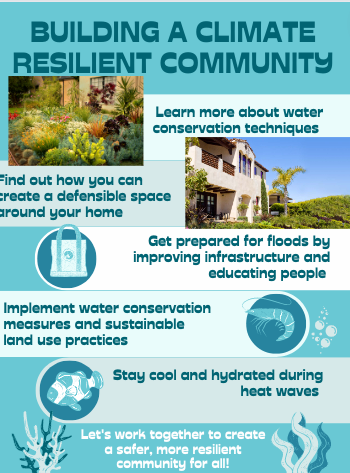Climate-related hazards such as drought, wildfire, flooding, and extreme heat can have significant impacts on communities. Drought can lead to water shortages and harm agricultural production. Wildfires can destroy infrastructure and flooding can damage property/transportation. To build a more resilient community, one proposed action is to implement community-wide water conservation measures. This can include promoting the use of drought-tolerant plants, encouraging the use of rain barrels and greywater systems, and implementing stricter regulations on water usage. Additionally, promoting sustainable land use practices, such as zoning for fire-resistant landscapes and creating defensible space around homes, can reduce the risk of wildfire. Educating the community about the risks of flooding and providing resources for preparing for and responding to floods can help build resilience. Communities can prepare for the heat waves by setting up cooling stations, providing air-conditioned public spaces, and educating the public on how to stay hydrated during extreme heat. Another action is to improve infrastructure to better withstand flooding and heavy rain. This can include upgrading drainage systems and building flood protection measures such as leeves. Overall, building a more resilient community requires a combination of proactive measures such as water conservation, sustainable land use, and flood protection.
Contact us
Thank you for your interest in contacting Future Engineers. We look forward to connecting with you!
General Inquiries
support@futureengineers.orgSponsorship Inquiries
sponsor@futureengineers.org
